Unit 7 Will people have robots?Section A (Grammar Focus-3c) 课件(共24张PPT) 2024-2025学年人教版英语八年级上册
文档属性
| 名称 | Unit 7 Will people have robots?Section A (Grammar Focus-3c) 课件(共24张PPT) 2024-2025学年人教版英语八年级上册 | 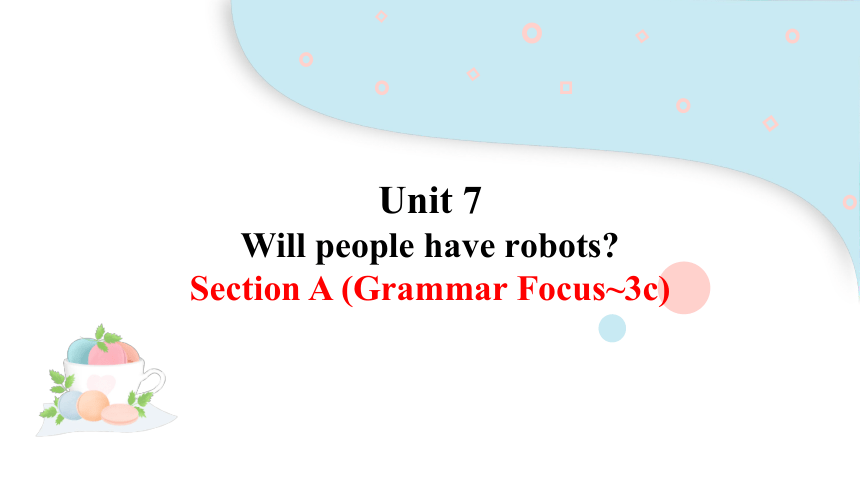 | |
| 格式 | pptx | ||
| 文件大小 | 2.1MB | ||
| 资源类型 | 教案 | ||
| 版本资源 | 人教新目标(Go for it)版 | ||
| 科目 | 英语 | ||
| 更新时间 | 2024-07-20 10:50:52 | ||
图片预览

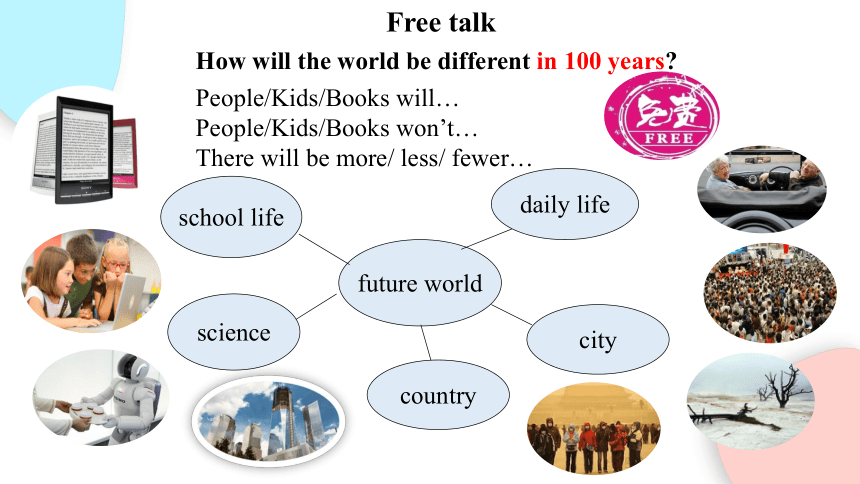
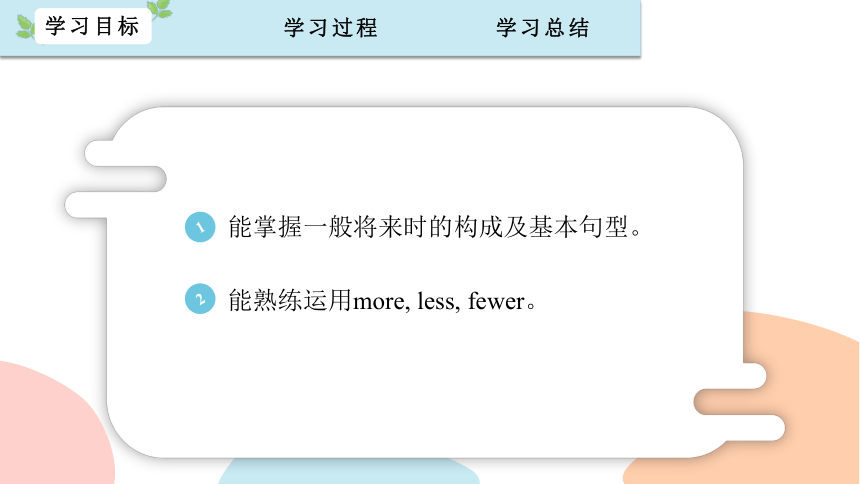
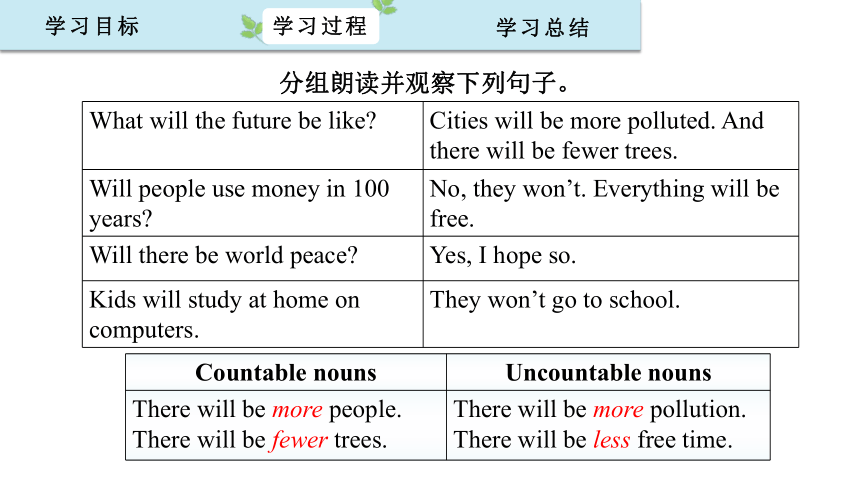
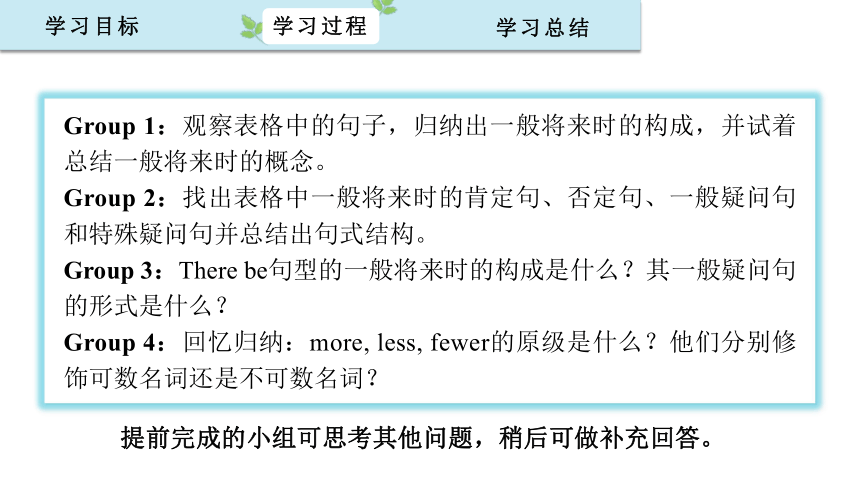
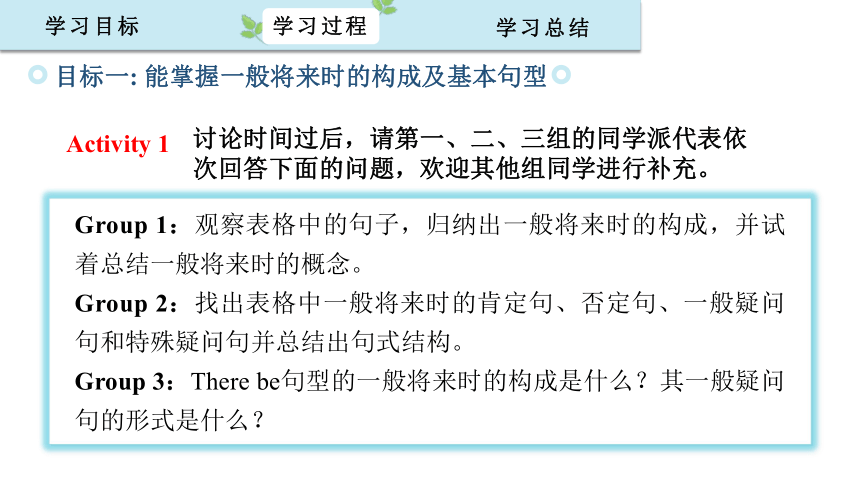
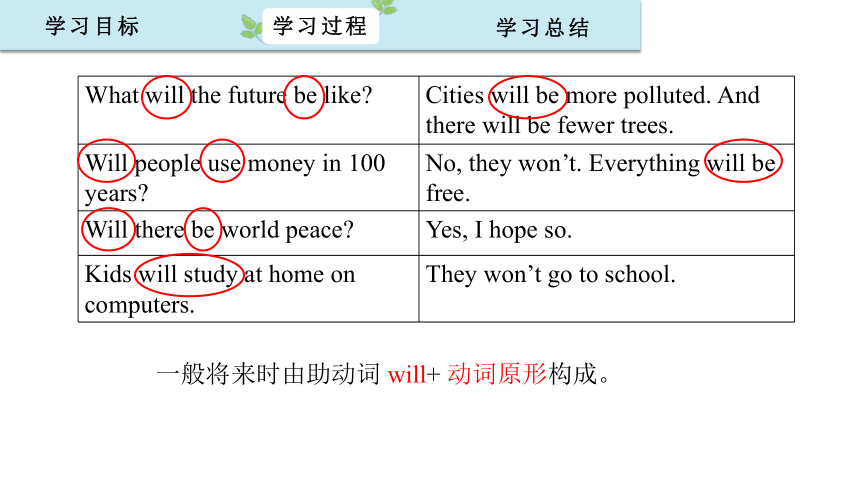
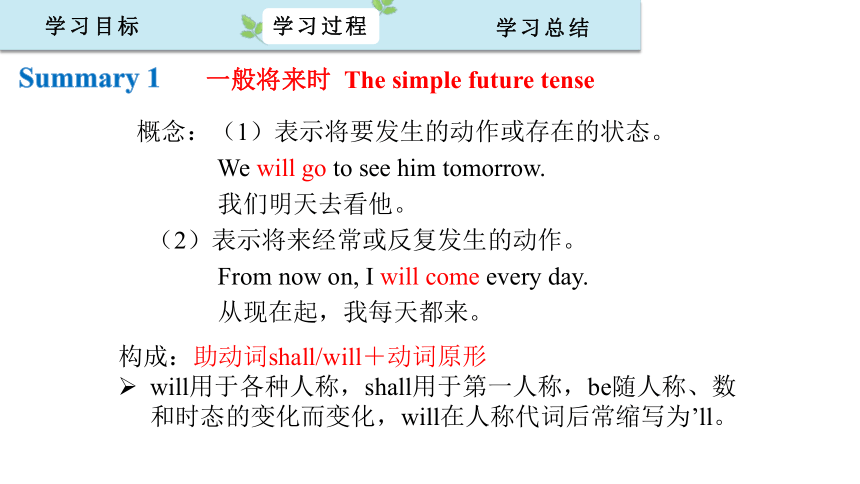
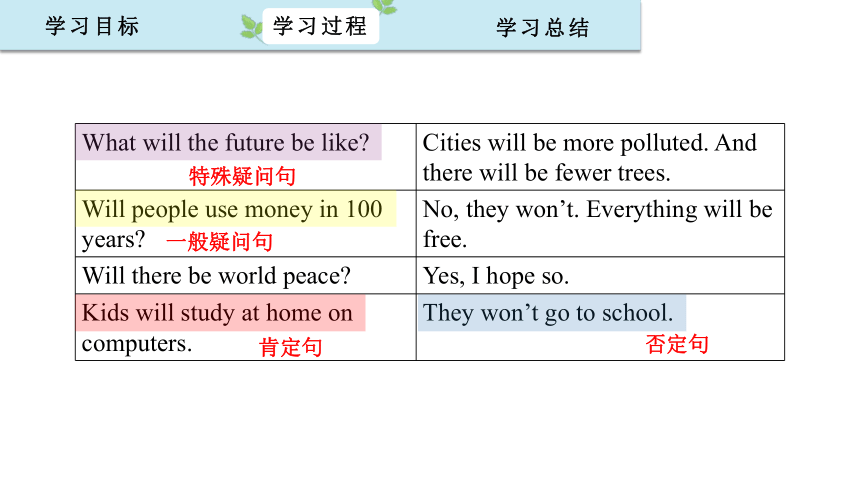
文档简介
(共24张PPT)
Unit 7
Will people have robots
Section A (Grammar Focus~3c)
Free talk
future world
school life
daily life
science
city
country
How will the world be different in 100 years
People/Kids/Books will…
People/Kids/Books won’t…
There will be more/ less/ fewer…
能熟练运用more, less, fewer。
1
能掌握一般将来时的构成及基本句型。
2
分组朗读并观察下列句子。
What will the future be like Cities will be more polluted. And there will be fewer trees.
Will people use money in 100 years No, they won’t. Everything will be free.
Will there be world peace Yes, I hope so.
Kids will study at home on computers. They won’t go to school.
Countable nouns Uncountable nouns
There will be more people. There will be fewer trees. There will be more pollution.
There will be less free time.
1 组
2 组
3 组
4 组
Divide the whole class into 4 groups and
each group discusses one question.
Group 1:观察表格中的句子,归纳出一般将来时的构成,并试着总结一般将来时的概念。
Group 2:找出表格中一般将来时的肯定句、否定句、一般疑问句和特殊疑问句并总结出句式结构。
Group 3:There be句型的一般将来时的构成是什么?其一般疑问句的形式是什么?
Group 4:回忆归纳:more, less, fewer的原级是什么?他们分别修饰可数名词还是不可数名词?
提前完成的小组可思考其他问题,稍后可做补充回答。
目标一: 能掌握一般将来时的构成及基本句型
讨论时间过后,请第一、二、三组的同学派代表依次回答下面的问题,欢迎其他组同学进行补充。
Activity 1
Group 1:观察表格中的句子,归纳出一般将来时的构成,并试着总结一般将来时的概念。
Group 2:找出表格中一般将来时的肯定句、否定句、一般疑问句和特殊疑问句并总结出句式结构。
Group 3:There be句型的一般将来时的构成是什么?其一般疑问句的形式是什么?
What will the future be like Cities will be more polluted. And there will be fewer trees.
Will people use money in 100 years No, they won’t. Everything will be free.
Will there be world peace Yes, I hope so.
Kids will study at home on computers. They won’t go to school.
一般将来时由助动词 will+ 动词原形构成。
Summary 1
概念:(1)表示将要发生的动作或存在的状态。
We will go to see him tomorrow.
我们明天去看他。
(2)表示将来经常或反复发生的动作。
From now on, I will come every day.
从现在起,我每天都来。
构成:助动词shall/will+动词原形
will用于各种人称,shall用于第一人称,be随人称、数和时态的变化而变化,will在人称代词后常缩写为’ll。
一般将来时 The simple future tense
What will the future be like Cities will be more polluted. And there will be fewer trees.
Will people use money in 100 years No, they won’t. Everything will be free.
Will there be world peace Yes, I hope so.
Kids will study at home on computers. They won’t go to school.
肯定句
否定句
一般疑问句
特殊疑问句
Summary 2
基本句型
肯定句:
否定句:
一般疑问句:
特殊疑问句:
主语 + shall / will +v. 原形.
主语 + shall / will +not + v.原形.
shall / will +主语 + v原形
特殊疑问词 + 一般疑问句
简略回答:
Yes, I shall. / Yes, I will.
No, I shall not. / No, I won’t.
Will there be world peace Yes, I hope so.
Kids will study at home on computers. They won’t go to school.
Countable nouns Uncountable nouns
There will be more people. There will be fewer trees. There will be more pollution.
There will be less free time.
2.其一般疑问句把will提前至句首:Will there be...。
1.There be 句型的一般将来时是There will be ...。
Summary 3
there be句型的一般将来时
(1)there be 句型的一般将来时的构成是
“ There will be+主语+其他.” ,意为“将会有……”。
There will be a basketball match tonight.今天晚上将有一场篮球赛。
(2)其一般疑问句形式为“Will there be+主语+其他?”其肯定回答是: “ Yes,there will.”。否定回答是:“No,there won’t.”。
—Will there be a basketball match tonight?
今天晚上将有一场篮球赛吗?
—Yes, there will.是的,会有。/No, there won’t.不,没有。
(3)否定形式是在will后加not,即“There won’t be+主语+其他.”,意为“将不会有……”。
eg: There won’t be a basketball match tonight.
今天晚上没有篮球赛。
(4)其特殊疑问句的构成是“疑问词/词组+一般疑问句?”。
eg: When will there be a basketball match
什么时候会有一场篮球赛呢?
tomorrow 明天
the day after tomorrow 后天
next week 下周
next year 明年
next month 下个月
soon 不久
the year after next 后年
一般将来时常用的时间状语:
the week after next 下下周
in+一段时间 ……之后
in the future 将来
this year/term/week…今年/这个学期/这周……
拓展
1). be going to 表示近期、眼下就要发生的事情,will 表示的将来时间则较远一些。
He is going to write a letter tonight.
He will write a book one day.
be going to 和 will 的区别:
2). be going to 表示根据主观判断将来肯定发生的事情,will表示客观上将来势必发生的事情。
He is seriously ill. He is going to die.
He will be twenty years old.
3). be going to 含有“计划,准备”的意思,而 will 则没有这个意思。
She is going to lend us her book.
He will be here in half an hour.
4). 在有条件从句的主句中,一般不用 be going to, 而用will。
If any beasts comes at you, I’ll stay with you and help you.
注意:
说 明 例 句
带有意愿色彩 天气很冷,我为你泡杯热咖啡吧。
It is very cold , I will make you some hot coffee.
问对方是否愿意或客气的邀请或命令 Will you please close the window
你能关一下窗户吗?
Will you go with us
你愿意和我们一起去吗?
在下列几种情况下要用will而不用be going to
目标二:能熟练运用more, less, fewer
讨论时间过后,请第四组的同学派代表回答下面的问题,欢迎其他组同学进行补充。
Activity 1
Group 4:回忆归纳:more, less, fewer的原级是什么?他们分别修饰可数名词还是不可数名词?
Countable nouns Uncountable nouns
There will be more people. There will be fewer trees. There will be more pollution.
There will be less free time.
more是 many 的比较级, 修饰可数名词复数,
more是 much 的比较级, 修饰不可数名词;
fewer 是 few 的比较级,可用来修饰可数名词;
less是 little 的比较级,可用来修饰不可数名词。
Activity 2
3a
Fill in the blanks with more, less or fewer.
1. In the future, there will be _____ fresh water because
there will be ______ pollution in the sea.
2. In 100 years, there will be ______ cars because there will be
______ people in the cities.
3. There will be _____ jobs for people because _____ robots
will do the same jobs as people.
4. I think there will be _____ cities because people will build
_____ buildings in the country.
5. In 50 years, people will have ____ free time because there
will be _____ things to do.
fewer
more
more
more
less
more
less
more
more
more
3b
Complete the predictions with what you think will happen.
1. Kids study at school now. In 100 years,
_________________________________
2. I sometimes see blue skies in my cities, but in the future
_________________________________
3. People now usually live to be about 70-80 years old, but in the future
__________________________________
4. Families usually spend time together on weekends, but maybe in 200 years, ___________________________________
they will study at home on computers.
I will almost see the blue skies every day.
people will live to be 200 years old.
families will spend time together every day.
Activity 3
3c
Draw a picture of what you think a city in the future will be like. Then describe it to the class.
用will+动词原形和more, fewer, less等描述未来的城市
I think there will be more tall buildings, and there will be fewer cars and more buses.
Example
There will be more people in the future. Because people will live to be 200 years old. There will be more high buildings. The cities will be more crowded but less polluted. Because there will be fewer cars and there will be more buses. People will mostly work on the Internet. There will be more robots working in the factory.
学习目标
通过本堂课的学习,你学到了什么?
能掌握一般将来时的构成及基本句型。
1
能熟练运用more, less, fewer。
2
Unit 7
Will people have robots
Section A (Grammar Focus~3c)
Free talk
future world
school life
daily life
science
city
country
How will the world be different in 100 years
People/Kids/Books will…
People/Kids/Books won’t…
There will be more/ less/ fewer…
能熟练运用more, less, fewer。
1
能掌握一般将来时的构成及基本句型。
2
分组朗读并观察下列句子。
What will the future be like Cities will be more polluted. And there will be fewer trees.
Will people use money in 100 years No, they won’t. Everything will be free.
Will there be world peace Yes, I hope so.
Kids will study at home on computers. They won’t go to school.
Countable nouns Uncountable nouns
There will be more people. There will be fewer trees. There will be more pollution.
There will be less free time.
1 组
2 组
3 组
4 组
Divide the whole class into 4 groups and
each group discusses one question.
Group 1:观察表格中的句子,归纳出一般将来时的构成,并试着总结一般将来时的概念。
Group 2:找出表格中一般将来时的肯定句、否定句、一般疑问句和特殊疑问句并总结出句式结构。
Group 3:There be句型的一般将来时的构成是什么?其一般疑问句的形式是什么?
Group 4:回忆归纳:more, less, fewer的原级是什么?他们分别修饰可数名词还是不可数名词?
提前完成的小组可思考其他问题,稍后可做补充回答。
目标一: 能掌握一般将来时的构成及基本句型
讨论时间过后,请第一、二、三组的同学派代表依次回答下面的问题,欢迎其他组同学进行补充。
Activity 1
Group 1:观察表格中的句子,归纳出一般将来时的构成,并试着总结一般将来时的概念。
Group 2:找出表格中一般将来时的肯定句、否定句、一般疑问句和特殊疑问句并总结出句式结构。
Group 3:There be句型的一般将来时的构成是什么?其一般疑问句的形式是什么?
What will the future be like Cities will be more polluted. And there will be fewer trees.
Will people use money in 100 years No, they won’t. Everything will be free.
Will there be world peace Yes, I hope so.
Kids will study at home on computers. They won’t go to school.
一般将来时由助动词 will+ 动词原形构成。
Summary 1
概念:(1)表示将要发生的动作或存在的状态。
We will go to see him tomorrow.
我们明天去看他。
(2)表示将来经常或反复发生的动作。
From now on, I will come every day.
从现在起,我每天都来。
构成:助动词shall/will+动词原形
will用于各种人称,shall用于第一人称,be随人称、数和时态的变化而变化,will在人称代词后常缩写为’ll。
一般将来时 The simple future tense
What will the future be like Cities will be more polluted. And there will be fewer trees.
Will people use money in 100 years No, they won’t. Everything will be free.
Will there be world peace Yes, I hope so.
Kids will study at home on computers. They won’t go to school.
肯定句
否定句
一般疑问句
特殊疑问句
Summary 2
基本句型
肯定句:
否定句:
一般疑问句:
特殊疑问句:
主语 + shall / will +v. 原形.
主语 + shall / will +not + v.原形.
shall / will +主语 + v原形
特殊疑问词 + 一般疑问句
简略回答:
Yes, I shall. / Yes, I will.
No, I shall not. / No, I won’t.
Will there be world peace Yes, I hope so.
Kids will study at home on computers. They won’t go to school.
Countable nouns Uncountable nouns
There will be more people. There will be fewer trees. There will be more pollution.
There will be less free time.
2.其一般疑问句把will提前至句首:Will there be...。
1.There be 句型的一般将来时是There will be ...。
Summary 3
there be句型的一般将来时
(1)there be 句型的一般将来时的构成是
“ There will be+主语+其他.” ,意为“将会有……”。
There will be a basketball match tonight.今天晚上将有一场篮球赛。
(2)其一般疑问句形式为“Will there be+主语+其他?”其肯定回答是: “ Yes,there will.”。否定回答是:“No,there won’t.”。
—Will there be a basketball match tonight?
今天晚上将有一场篮球赛吗?
—Yes, there will.是的,会有。/No, there won’t.不,没有。
(3)否定形式是在will后加not,即“There won’t be+主语+其他.”,意为“将不会有……”。
eg: There won’t be a basketball match tonight.
今天晚上没有篮球赛。
(4)其特殊疑问句的构成是“疑问词/词组+一般疑问句?”。
eg: When will there be a basketball match
什么时候会有一场篮球赛呢?
tomorrow 明天
the day after tomorrow 后天
next week 下周
next year 明年
next month 下个月
soon 不久
the year after next 后年
一般将来时常用的时间状语:
the week after next 下下周
in+一段时间 ……之后
in the future 将来
this year/term/week…今年/这个学期/这周……
拓展
1). be going to 表示近期、眼下就要发生的事情,will 表示的将来时间则较远一些。
He is going to write a letter tonight.
He will write a book one day.
be going to 和 will 的区别:
2). be going to 表示根据主观判断将来肯定发生的事情,will表示客观上将来势必发生的事情。
He is seriously ill. He is going to die.
He will be twenty years old.
3). be going to 含有“计划,准备”的意思,而 will 则没有这个意思。
She is going to lend us her book.
He will be here in half an hour.
4). 在有条件从句的主句中,一般不用 be going to, 而用will。
If any beasts comes at you, I’ll stay with you and help you.
注意:
说 明 例 句
带有意愿色彩 天气很冷,我为你泡杯热咖啡吧。
It is very cold , I will make you some hot coffee.
问对方是否愿意或客气的邀请或命令 Will you please close the window
你能关一下窗户吗?
Will you go with us
你愿意和我们一起去吗?
在下列几种情况下要用will而不用be going to
目标二:能熟练运用more, less, fewer
讨论时间过后,请第四组的同学派代表回答下面的问题,欢迎其他组同学进行补充。
Activity 1
Group 4:回忆归纳:more, less, fewer的原级是什么?他们分别修饰可数名词还是不可数名词?
Countable nouns Uncountable nouns
There will be more people. There will be fewer trees. There will be more pollution.
There will be less free time.
more是 many 的比较级, 修饰可数名词复数,
more是 much 的比较级, 修饰不可数名词;
fewer 是 few 的比较级,可用来修饰可数名词;
less是 little 的比较级,可用来修饰不可数名词。
Activity 2
3a
Fill in the blanks with more, less or fewer.
1. In the future, there will be _____ fresh water because
there will be ______ pollution in the sea.
2. In 100 years, there will be ______ cars because there will be
______ people in the cities.
3. There will be _____ jobs for people because _____ robots
will do the same jobs as people.
4. I think there will be _____ cities because people will build
_____ buildings in the country.
5. In 50 years, people will have ____ free time because there
will be _____ things to do.
fewer
more
more
more
less
more
less
more
more
more
3b
Complete the predictions with what you think will happen.
1. Kids study at school now. In 100 years,
_________________________________
2. I sometimes see blue skies in my cities, but in the future
_________________________________
3. People now usually live to be about 70-80 years old, but in the future
__________________________________
4. Families usually spend time together on weekends, but maybe in 200 years, ___________________________________
they will study at home on computers.
I will almost see the blue skies every day.
people will live to be 200 years old.
families will spend time together every day.
Activity 3
3c
Draw a picture of what you think a city in the future will be like. Then describe it to the class.
用will+动词原形和more, fewer, less等描述未来的城市
I think there will be more tall buildings, and there will be fewer cars and more buses.
Example
There will be more people in the future. Because people will live to be 200 years old. There will be more high buildings. The cities will be more crowded but less polluted. Because there will be fewer cars and there will be more buses. People will mostly work on the Internet. There will be more robots working in the factory.
学习目标
通过本堂课的学习,你学到了什么?
能掌握一般将来时的构成及基本句型。
1
能熟练运用more, less, fewer。
2
同课章节目录
- Unit 1 Where did you go on vacation?
- Section A
- Section B
- Unit 2 How often do you exercise?
- Section A
- Section B
- Unit 3 I'm more outgoing than my sister.
- Section A
- Section B
- Unit 4 What's the best movie theater?
- Section A
- Section B
- Unit 5 Do you want to watch a game show?
- Section A
- Section B
- Unit 6 I'm going to study computer science.
- Section A
- Section B
- Unit 7 Will people have robots?
- Section A
- Section B
- Unit 8 How do you make a banana milk shake?
- Section A
- Section B
- Unit 9 Can you come to my party?
- Section A
- Section B
- Unit 10 If you go to the party, you'll have a grea
- Section A
- Section B
